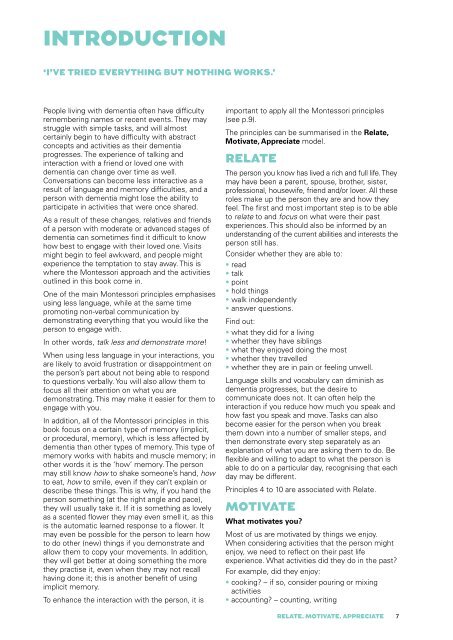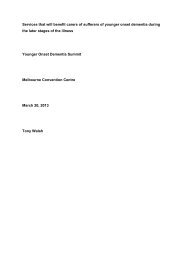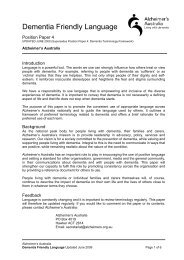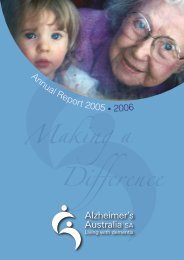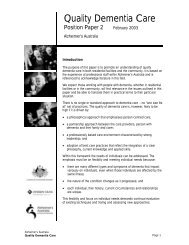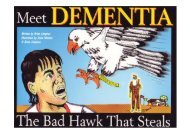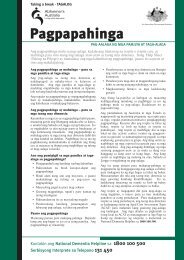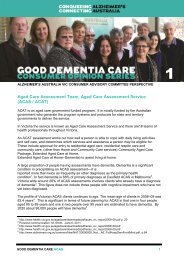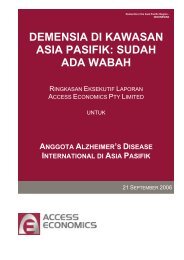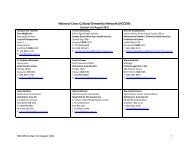RELATE, MOTIVATE, APPRECIATE - Alzheimer's Australia
RELATE, MOTIVATE, APPRECIATE - Alzheimer's Australia
RELATE, MOTIVATE, APPRECIATE - Alzheimer's Australia
You also want an ePaper? Increase the reach of your titles
YUMPU automatically turns print PDFs into web optimized ePapers that Google loves.
INTRODUCTION<br />
‘I’ve tried everything but nothing works.’<br />
People living with dementia often have difficulty<br />
remembering names or recent events. They may<br />
struggle with simple tasks, and will almost<br />
certainly begin to have difficulty with abstract<br />
concepts and activities as their dementia<br />
progresses. The experience of talking and<br />
interaction with a friend or loved one with<br />
dementia can change over time as well.<br />
Conversations can become less interactive as a<br />
result of language and memory difficulties, and a<br />
person with dementia might lose the ability to<br />
participate in activities that were once shared.<br />
As a result of these changes, relatives and friends<br />
of a person with moderate or advanced stages of<br />
dementia can sometimes find it difficult to know<br />
how best to engage with their loved one. Visits<br />
might begin to feel awkward, and people might<br />
experience the temptation to stay away. This is<br />
where the Montessori approach and the activities<br />
outlined in this book come in.<br />
One of the main Montessori principles emphasises<br />
using less language, while at the same time<br />
promoting non-verbal communication by<br />
demonstrating everything that you would like the<br />
person to engage with.<br />
In other words, talk less and demonstrate more!<br />
When using less language in your interactions, you<br />
are likely to avoid frustration or disappointment on<br />
the person’s part about not being able to respond<br />
to questions verbally. You will also allow them to<br />
focus all their attention on what you are<br />
demonstrating. This may make it easier for them to<br />
engage with you.<br />
In addition, all of the Montessori principles in this<br />
book focus on a certain type of memory (implicit,<br />
or procedural, memory), which is less affected by<br />
dementia than other types of memory. This type of<br />
memory works with habits and muscle memory; in<br />
other words it is the ‘how’ memory. The person<br />
may still know how to shake someone’s hand, how<br />
to eat, how to smile, even if they can’t explain or<br />
describe these things. This is why, if you hand the<br />
person something (at the right angle and pace),<br />
they will usually take it. If it is something as lovely<br />
as a scented flower they may even smell it, as this<br />
is the automatic learned response to a flower. It<br />
may even be possible for the person to learn how<br />
to do other (new) things if you demonstrate and<br />
allow them to copy your movements. In addition,<br />
they will get better at doing something the more<br />
they practise it, even when they may not recall<br />
having done it; this is another benefit of using<br />
implicit memory.<br />
To enhance the interaction with the person, it is<br />
important to apply all the Montessori principles<br />
(see p.9).<br />
The principles can be summarised in the Relate,<br />
Motivate, Appreciate model.<br />
Relate<br />
The person you know has lived a rich and full life. They<br />
may have been a parent, spouse, brother, sister,<br />
professional, housewife, friend and/or lover. All these<br />
roles make up the person they are and how they<br />
feel. The first and most important step is to be able<br />
to relate to and focus on what were their past<br />
experiences. This should also be informed by an<br />
understanding of the current abilities and interests the<br />
person still has.<br />
Consider whether they are able to:<br />
• read<br />
• talk<br />
• point<br />
• hold things<br />
• walk independently<br />
• answer questions.<br />
Find out:<br />
• what they did for a living<br />
• whether they have siblings<br />
• what they enjoyed doing the most<br />
• whether they travelled<br />
• whether they are in pain or feeling unwell.<br />
Language skills and vocabulary can diminish as<br />
dementia progresses, but the desire to<br />
communicate does not. It can often help the<br />
interaction if you reduce how much you speak and<br />
how fast you speak and move. Tasks can also<br />
become easier for the person when you break<br />
them down into a number of smaller steps, and<br />
then demonstrate every step separately as an<br />
explanation of what you are asking them to do. Be<br />
flexible and willing to adapt to what the person is<br />
able to do on a particular day, recognising that each<br />
day may be different.<br />
Principles 4 to 10 are associated with Relate.<br />
Motivate<br />
What motivates you?<br />
Most of us are motivated by things we enjoy.<br />
When considering activities that the person might<br />
enjoy, we need to reflect on their past life<br />
experience. What activities did they do in the past?<br />
For example, did they enjoy:<br />
• cooking? – if so, consider pouring or mixing<br />
activities<br />
• accounting? – counting, writing<br />
<strong>RELATE</strong>, <strong>MOTIVATE</strong>, <strong>APPRECIATE</strong> 7


